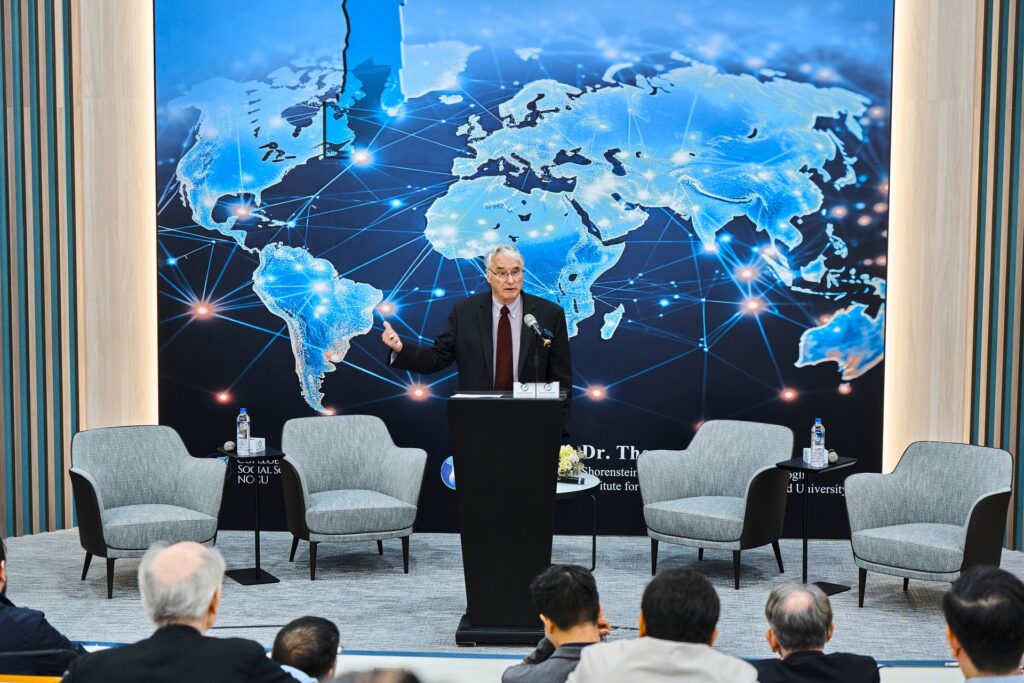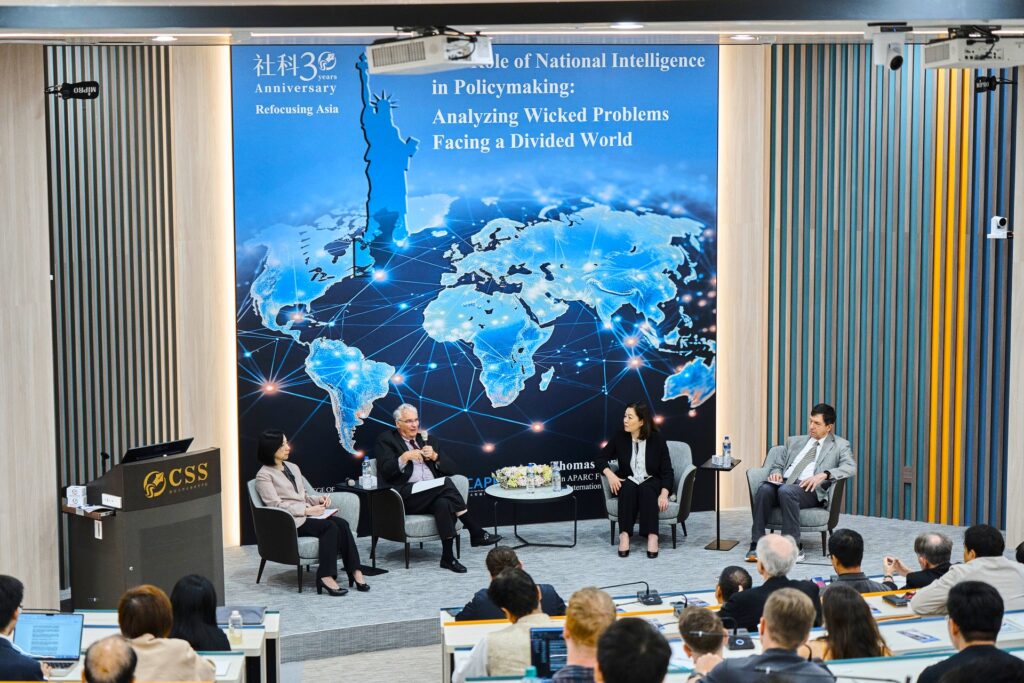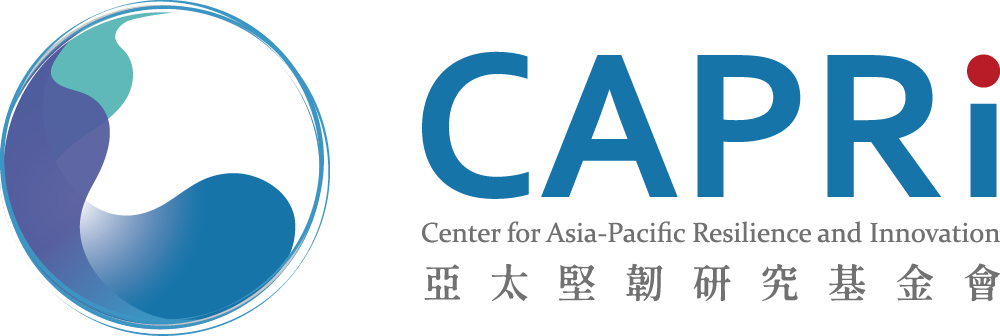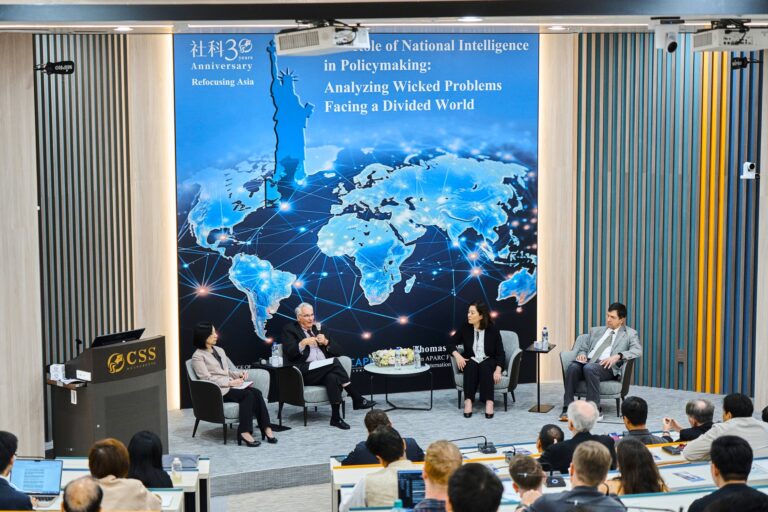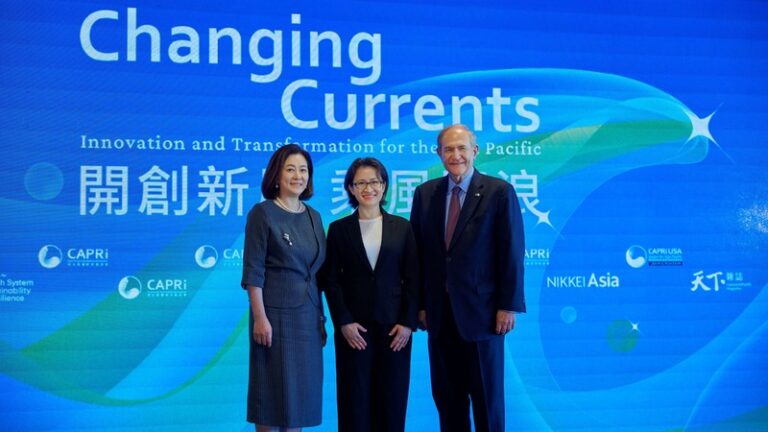[trp_language language=”en_US”]
TAIPEI, TAIWAN June 6, 2024 — The Center for Asia-Pacific Resilience and Innovation (CAPRI) invited Dr. Thomas Fingar, former Deputy Director of National Intelligence for Analysis and Chairman of the U.S. National Intelligence Council (2005–2008), at National Chengchi University (NCCU) to present a talk on the role of national intelligence in policymaking.
Given the critical role that professional intelligence analysis plays in policy discussion and formulation, CAPRI, a Taipei-based nongovernmental, nonpartisan international think tank focused on comparative public policy research of Asia-Pacific societies, invited Dr. Fingar to Taiwan. Over 100 individuals attended the lecture, including government leaders, diplomats, business representatives, scholars, and students.
Prof. Harry Harding, who is a CAPRI board member, Yushan Scholar at NCCU, and an expert in public policy and US-China relations, opened the forum. He shared his long-standing personal and professional connection with Dr. Fingar and provided a detailed introduction of Dr. Fingar’s work as an intelligence analyst, mentioning that under Dr. Fingar’s leadership, the Bureau of Intelligence and Research (INR), developed a reputation for its quality and unbiased analysis.
Dr. Fingar focused on the workings and usefulness of intelligence analysis in policymaking. He explained that intelligence involves filtering vast amounts of unclassified information to identify timely insights to support policymakers in their decision-making. Dr. Fingar also distinguished between academic research and intelligence work: academics choose their research questions and have ample time to explore them, while intelligence analysts must quickly address pressing issues tailored to the decision maker. He acknowledged that the intelligence community is not infallible, citing instances where it failed to predict events like the Soviet Union’s collapse. However, the value lies in the usefulness of the input rather than absolute accuracy.
Using various examples, including the Russian invasion of Ukraine, the resurgence of polio, and the effects of climate change, Dr. Fingar illustrated the challenges of dealing with “wicked problems”—complex issues that require long-term, multifaceted approaches. For instance, the intelligence community predicted that the 2022 Russia–Ukraine war would cause starvation in Africa and, consequently, mass migration because of the grain blockade. However, other factors including the interconnectedness of global markets and export restrictions by countries such as India prevented this adverse outcome. By contrast, as the polio cases began to rise globally, the intelligence community identified the preachings of a couple of clerics in northern Nigeria proclaiming that polio vaccine is a Christian strategy to sterilize Muslims. Eventually, engaging local Muslim clerics in mobilizing the community helped check the epidemic.
Factors crucial to effective intelligence include the expertise and integrity of analysts, the importance of trust and objectivity in their work, and the collaborative efforts required among intelligence communities and policymakers to address complex global challenges.
He ended his talk by saying, “Wicked problems are wicked because they can’t be solved by a single government.” They require cooperation with other countries, particularly key countries such as the US and China, to ensure that one international player doesn’t negate the solution implemented by the other.
His talk was followed by a Q&A session moderated by Prof. Syaru Shirley Lin, founder and chair of CAPRI. Dr. Fingar answered several questions related to the usefulness of intelligence research in not only foreign but also domestic policy making, privatization of intelligence analysis, sharing information with countries that are not US’s allies, defense diplomacy, prediction markets, as well as governing and interpretation of intelligence.
This lecture, co-hosted by the Ministry of Education Yushan Scholar Program and the College of Social Sciences at NCCU, will be available for viewing on the CAPRI website and the NCCU College of Social Sciences website.
[/trp_language]
[trp_language language=”zh_TW”]
【台北,2024年6月6日】——美國前國家情報分析副總監及國家情報委員會主席(2005-2008)馮稼時博士(Dr. Thomas Fingar),受亞太堅韌研究基金會(亞堅會)邀請,今天(6/6)於國立政治大學演講,闡述全球政經變局和個別焦點議題,如何影響情報分析及世界主要國家的決策。本次公開演講由亞堅會、國立政治大學社會科學學院及教育部玉山學者計畫共同舉辦,由政大社科院院長楊婉瑩主持,政大玉山學者暨社科院IDAS學程客座教授Harry Harding及亞堅會創辦人暨董事長林夏如擔任與談人。
題為「洞察先機:情報分析如何形塑政策制定」(The Role of National Intelligence in Policymaking: Analyzing Wicked Problems Facing a Divided World)的公開講座,吸引到國內與海外智庫領袖、駐台外國機構代表、企業代表、學者與眾多青年學子等逾百位與會者與馮稼時博士交流。
現為史丹佛大學舒思深亞太研究中心學人的馮博士,同時為中國問題專家,曾於1970年代來台學習華語。本次為華府解除高層官員卸任限制後,再度訪台。馮稼時博士在美國反恐戰爭期間為白宮提供政策諮詢。他曾在2003年伊拉克戰爭前,力排眾議,指出情報分析顯示,並未發現伊拉克擁有大規模殺傷性武器。及至2007年,由他領導針對伊朗的情報評估揭示,伊朗其時沒有進行發展核武的計劃。這份論據翔實的報告影響了白宮的決策,避免美國陷入另一場因情報錯誤而發動的戰爭。
馮博士是次應亞堅會邀請赴台,盼讓台灣各界認識準確且全面的情報分析如何協助決策者制定更貼近現實的政策。當年與馮博士並肩在台灣學習華語的亞堅會董事、教育部玉山學者、中國研究專家何漢理教授(Prof. Harry Harding)在開場致詞表示,亞堅會是立足台灣的非政府、超黨派國際智庫,致力從亞太的觀點引領全球政策討論,推動創新治理,強化社會韌性。
馮稼時博士指出,「判斷情報分析價值的最關鍵指標,在於是否及時、是否在決策者需要的當下產生了幫助。」無論是國際面的衝突外交還是社會面的永續發展,公共政策的制定都更加依賴專業的情報分析人員與決策者之間的互信。
馮稼時博士的演講以國家情報分析在政府決策中扮演的角色為主軸,涵蓋美俄關係、俄烏戰爭、加沙衝突等焦點議題,更談及氣候變遷、能源危機等關乎世界長期發展格局的趨勢變化。
「我們面臨的挑戰之所以棘手,正是因為這些問題無法由任何政府獨自解決;要達成合作,我們需要知道彼此的意圖和需求。」馮稼時博士認為,面對日漸壁壘分明的國際政治格局,情報分析對解決全球共同面對的挑戰至關重要,情報界亦需要與國內外各利益攸關方合作。「了解決策者和(各個)利益攸關方的意圖和需求」不僅是情報分析應遵循的不二法則,更是情報界對決策的貢獻所在。
有觀眾問及,人工智慧大潮席捲全球,日趨多元的資訊來源對情報分析帶來何種衝擊?馮稼時博士回應,新技術和算法為國家情報分析提供了海量數據與全新工具,但仍無法取代情報分析專業人員的價值。馮稼時博士強調,從「數據」轉化為「情報」並最終服務於「政策」,其中關鍵在於情報界對數據的解讀,以及情報分析人員與決策者之間的互動。
亞堅會創辦人暨董事長林夏如教授於活動後談及邀請馮稼時博士赴台的初衷:政策智庫與情報界都肩負提升政策制定水準、促進民眾福祉的使命,亞堅會力求以國際視野和專業的分析為亞太各國決策者提供切實可行的政策建議。通過邀請馮稼時博士赴台進行公開演講並與各界交流,亞堅會將國際專業視角與在地社會需求相結合,旨在促進台灣與亞太地區的政策制定水準,以應對未來多重面向的挑戰。
[/trp_language]
